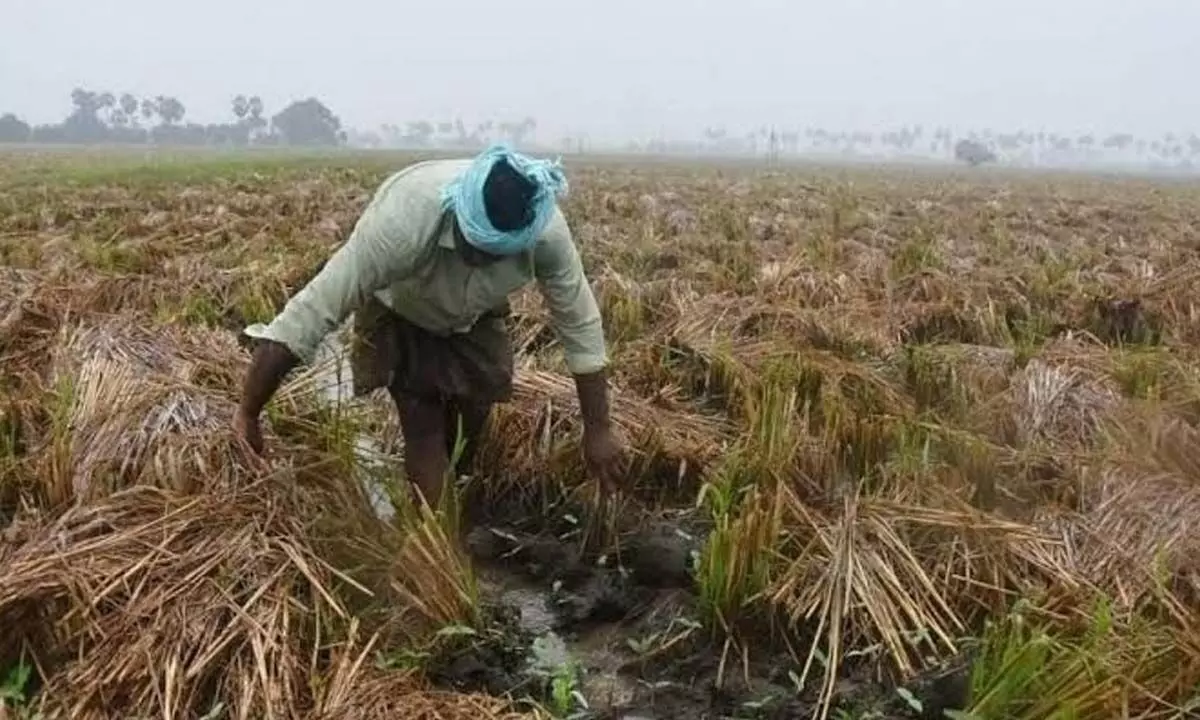Farmers hail friendly land lease policy for solar plants

A withered groundnut crop
- Under the policy, the farmers can give land for lease for a period of 30 years and get a lease amount of `30,000 every year
- On an average if a farmer leases 3-acre to a solar plant, he or she gets `90,000 to `1 lakh and the lease amount increases every two years
Anantapur-Puttaparthi: In the context of New and Renewable Energy export policy, under which solar energy parks are being established in multiple regions in the state, particularly in the Rayalaseema region, the state government introduced a farmer-friendly land lease policy under which lands will be taken on lease from the farmers for a period of 30 years and paid a lease amount of Rs 30,000 every year. This lease amount will be enhanced by 5 per cent every 2 years. So, by the time the lease period comes to an end, the lease amount reaches Rs 40,000 per acre. Small and marginal farmers tend to benefit immensely as a small farmer possesses anywhere between 2-5 acres.
On an average if a farmer leases 3-acre to a solar plant, he or she gets Rs 90,000 to Rs 1,00,000 even as the lease amount increases every two years. Ramana Reddy, a farmer from Rayadurg mandal, who is identified as a prospective land leaser, told The Hans India that he is expecting a payment of Rs 90,000 from the solar company every year for 30 years which means that not only his family even his children would benefit from the deal. Dwelling on the economics of his groundnut crop cultivation, Ramana says that he had been a loser as his crop had always been subject to vagaries of nature and therefore no guarantees on returns on his investment.
A beaming Ramana says that he gets a guaranteed income of a minimum of Rs 7,000 every month. In rural economy it is quite a money to keep the family going. The best part of the scheme is my ownership of land remains intact.
Compared to the past land acquisition policies, this seemed highly advantageous to the farmers as guaranteed income every month for 30 years and secondly, I am still the owner of my land, he added.
"Once the project falls in place, farmers would queue up to give their lands in other places. Millions of farmers would benefit when 5 lakh acres of land are procurred. This is more so in the context of agriculture being viewed as a losing proposition.
Unlike in the past when lands are forcibly acquired under the land acquisition act, this land lease policy would make farmers run after the government to procure their land," NREDCAP district manager Kodandarama Murthy said while interacting with The Hans India.
Sarojinamma, a scheduled caste vegetable farmer growing tomatoes and leafy vegetables from Kothacheruvu in Sathya Sai district, told The Hans India that she is looking forward to giving away her 2-acre land for the proposed solar project. Raising tomatoes is a hand to mouth affair, growing tomatoes is a risky business and the market is volatile. Several times prices crashed to rock bottom and our investment goes for a toss, landing me in bankruptcy. This is the best package that anyone can give to a farmer. If I give my land, I would get Rs 60,000 per year and Rs 5,000 a month. That is more than enough to keep my family going. Besides my husband gets Rs 2,750 government pension. She hailed the lease policy.
Her two sons would still be heirs of her land and would retain ownership of the land, she exclaimed! Going by the way the Union and state governments are exploring Solar energy, day is not far off when renewable energy would replace thermal and hydel projects in the state. By 2035, the Union government is planning to produce an additional 500 gigawatts which means 1.70 lakh megawatts of renewable energy. This would have a great impact on local economy and local communities.
Impressed by the state government's renewable energy export policy, the people's representatives in Seema region are taking the lead to procure and line up 10,000 to 15,000 acres of land in their constituencies and hand it over on a gold plater to developer companies.








